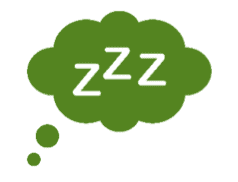How Hormones Affect Your Sleep (Part 2)

I hope you tried a number of the Sleep Tips from last week’s blog. And that you got a lot more Zzzzzzs as a result.

But there are some factors lurking outside of your direct control that may keep you from a full night of blissful sleep… Hormones. Hormones are the chemical messengers in our bodies, and they control or affect all of our bodily functions. They are super important, and super complex. So let’s take a look at the ones most directly involved in sleep.
Hormones That Affect Sleep
Cortisol:
The hormone cortisol, which is our “awake” hormone, increases the more anxious, busy and stressed we feel. Too much cortisol has been linked to many health conditions such as heart disease, diabetes, obesity, and high blood pressure. Anytime you hear researchers linking stress to health issues, too much cortisol is the key hormone involved.
We need to have low levels of cortisol in order to sleep. A racing mind, anxiety, or too many stimulants like coffee, alcohol, or exercise before bed can all keep cortisol levels too high and prevent us from falling asleep.
ACTH:
Normally, our cortisol levels stay low until we wake up in the morning. But between 3:00 a.m.–4:00 a.m. we secrete a hormone called ACTH from the pituitary. It is the precursor to cortisol and tells the adrenals to start production when we wake up. Sometimes, if we’re stressed and tired and not supporting the adrenals, the message gets sent too soon, and we wake up in the middle of the night. Once cortisol is pumping, we can’t go back to sleep.
If this happens to you, notice what’s on your mind at that time. What often happens is that you start to roll over or change positions while asleep, you lightly awaken to do that, and then a thought pops into your head. And boom! You’re awake. Your heart may even start pumping a bit too much if it’s an upsetting or worrisome thought.
Too much cortisol can also affect estrogen, testosterone, and progesterone levels as well as thyroid hormones. Hormones such as insulin and glucagon are also influenced by cortisol. Actually, all functions in the body can be influenced by cortisol.
Menopausal women often have trouble with sleep because their progesterone and estrogen levels are low. When the ovaries stop producing hormones after menopause, the adrenal glands, which produce cortisol, also produce estrogen and progesterone.
The Hormones That Affect Your Sleep
Too Much Cortisol: Cortisol is our “awake” hormone, so if you are too stressed, working long hours, worried or anxious, you may not lower your cortisol sufficiently to be able to fall asleep. Cortisol is supposed to gradually decrease throughout the evening so it’s low at bedtime. It should stay low until you’re ready to get up in the morning. If you wake up in the middle of the night and can’t get back to sleep, the body has started to pump cortisol too soon.
High Thyroid Hormones: High thyroid function leads to hyperactivity and interferes with sleep.
Low Estrogen: Since estrogen helps promote sleep, a deficiency in it is going to lead to sleep issues.
Low Progesterone: Progesterone aids relaxation and promotes sleep. Often high cortisol and low progesterone levels go together.
Low Testosterone: This can also affect the ability to sleep.
Low Melatonin: Too little melatonin can affect reproductive hormones and brain neurotransmitters, such as serotonin, which allow you to relax. In turn, this can cost you sleep. You produce melatonin while you sleep, generally between midnight and 2:00 a.m.
The Hormones That Are Affected by Lack of Sleep
Lack of sleep can also cause problems with various hormones, including:
- reproductive hormones
- thyroid hormones
- Insulin
- Ghrelin (affects appetite)
- Leptin (affects satiety)
Gut Health and Sleep
Our gut microbes sleep when we sleep, and this is essential to their survival. Just one night of no sleep can cause a decrease in the quality and quantity of our good gut bacteria. Feeding our body both good prebiotic and fermented foods makes our gut microbes happy.
Check out last week’s Tips for Sleeping for things you can do today to improve your sleep habits. Another action is getting a hormone assessment to see if you may have an imbalance. You can get your hormone levels checked by your care provider, and consider food, supplements, or lifestyle changes to address imbalances. Check out The Midlife to Great Life Method for a 12 week comprehensive program to balance your hormones naturally.
Solving your sleep issues is going to be a game-changer. You will be amazed by how much better you will feel and the new energy and vitality you’ll discover.
My goal is to help you through your sleep or any other health challenges. As a Registered Nutrition Therapist, I am dedicated to helping clients with their health journey.
If you have any questions, please feel free to contact me at info@nancyleehall.com

